4 statements reveal that Cullerton doesn’t understand Illinois’ workers’ compensation system
Illinois has the most expensive system in the Midwest for workers' compensation.
Illinois Senate President John Cullerton has made repeated statements that demonstrate his failure to understand Illinois’ workers’ compensation program, let alone the problems that plague the system. Four specific examples of consistent Cullerton statements reveal he is either confused about the problems in Illinois’ workers’ compensation system, or he’s playing dumb to resist reform. The four examples are:
- Insisting that reforming workers’ compensation is not an economic development issue
- Complaining that Gov. Bruce Rauner should not insist on workers’ compensation reform because the General Assembly already addressed the program in 2011
- Implying that workers’ compensation is a nonbudgetary issue
- Saying that Illinois workers’ compensation costs have been cut in half over the last 20 years
Workers’ compensation reform is an economic-development tool
Cullerton’s claim that “Workers’ comp is not an economic development tool,” as quoted in Crains Chicago Business and various other outlets, puts Cullerton at odds with his own previous statements. Here is Cullerton’s statement on his own webpage from 2011, after a vote on workers’ compensation reform:
A workers’ comp overhaul is the single most important legislation we could pass this session to improve the business climate.
So either Cullerton believes true workers’ compensation reform is in fact an economic-development tool, as he did in 2011, or he thinks that “the single most important legislation” the legislature could pass to improve the business climate is somehow unrelated to economic development.
The Illinois General Assembly has not fixed the state’s workers’ compensation problem
Next is Cullerton’s claim that Rauner should not insist on reforming workers’ compensation because the General Assembly already addressed workers’ compensation reform with legislation in 2011. Cullerton said Rauner “needs to understand what we’ve already done” because changes made in a 2011 law have resulted in reduced rates. On other occasions, Cullerton has more directly remarked that they’ve already reformed the system.
(For reference, the Illinois Policy Institute summarized the marginal 2011 reform legislation here and pointed out at least one serious problem caused by that legislation here. Some other reforms necessary to fix the overall system are also addressed here. A forthcoming Illinois Policy Institute paper will comprehensively address reform issues.)
Rates have come down some since the 2011 legislation, and there were a few helpful parts to that law, but Illinois is still easily the least competitive state in the region for workers’ compensation. How’s that for reform?
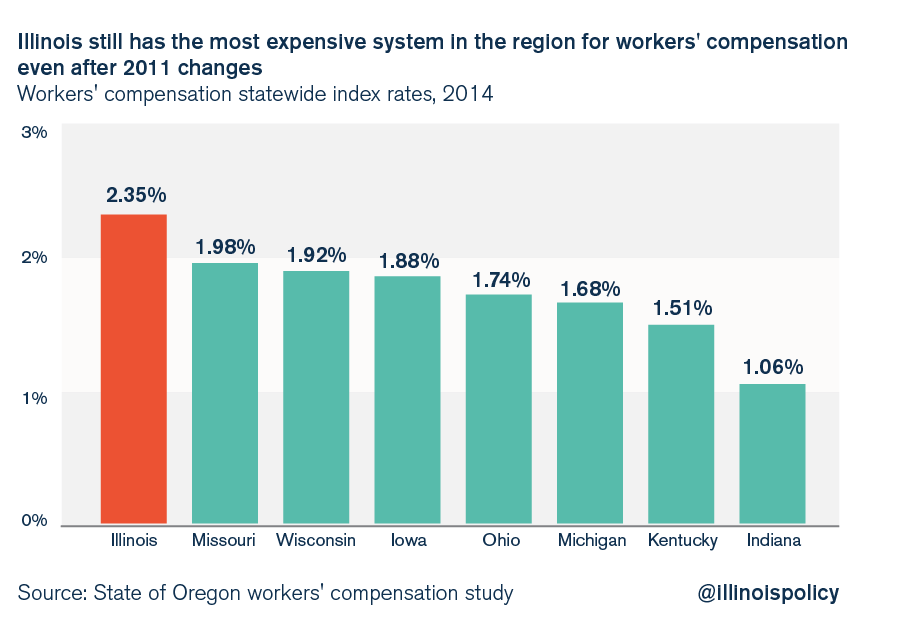
In addition, to really see how completely out of line Illinois is on this regulatory issue, consider the workers’ compensation premiums as of July 2015 for more risk-intense industries such as manufacturing, construction and transportation shown here. These industries are where all the economic pain from this issue manifests itself, and they show that the system is obviously still broken.
Workers’ compensation is a budgetary issue
Cullerton, like Illinois House Speaker Mike Madigan, insists that workers’ compensation is one of Rauner’s “nonbudgetary issues.” Workers’ compensation is actually doubly a budget issue: It drives hundreds of millions, if not billions in government expenses and at least tens of millions in government revenues.
Here are three ways that workers’ compensation directly affects the budget:
- As the largest employers in the state, Illinois’ many governments combined pay tens of billions of dollars in wages every year. They pay out hundreds of millions of dollars per year in workers’ compensation. (Illinois Policy previously estimated $600 million per year, but based on forthcoming research that estimate is likely too low.) Reforming workers’ compensation would save governments in Illinois hundreds of millions of dollars per year.
- The cost of workers’ compensation is priced into approximately $10 billion per year of public construction projects. Consider, for example, the cost of workers’ compensation for a concrete-construction worker in Illinois compared with costs in other states. This shows that workers’ compensation consumes an excess of tax dollars for public construction.
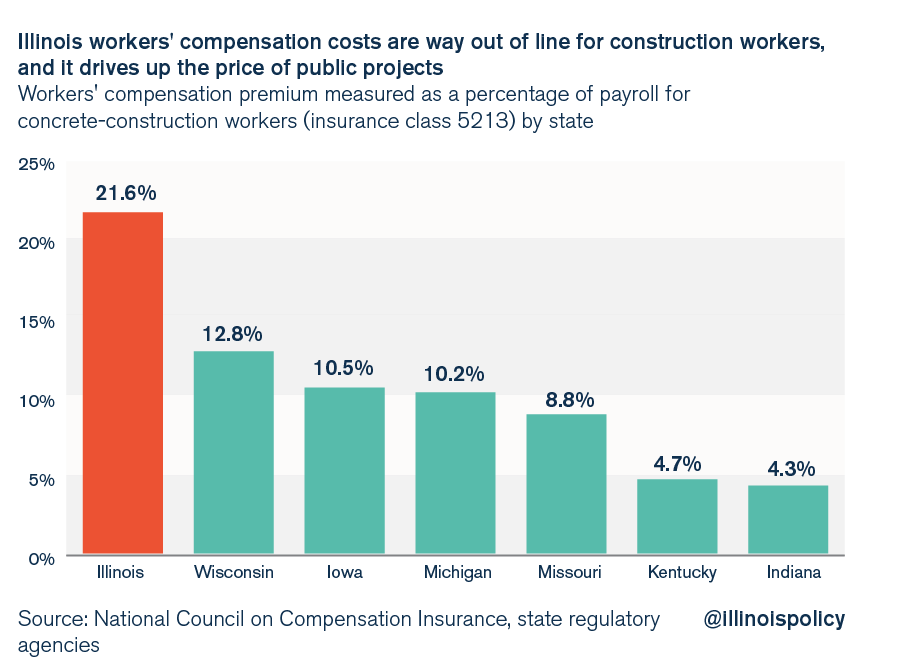
- A fair and competitive system would lead to more investment, job creation and economic growth in Illinois, which means more tax revenue. In addition, workers’ compensation benefits are untaxed, so when businesses distribute excessive workers compensation awards, they lose investment dollars, and workers receive payments on which they pay no taxes.
Clearly, workers’ compensation is a major budget issue for state and local governments.
Workers’ compensation costs are falling because workplaces are becoming safer, and industrial jobs are being lost, and businesses are fleeing Illinois
Finally, just last week while speaking to the Illinois Chamber of Commerce, Cullerton repeated an often-used line that Illinois’ workers’ compensation costs have been cut in half over the last 20 years.
This statement is technically true, although it is incredibly misleading for three important reasons:
- First, all states’ average costs have fallen because workplace safety has improved over the last 20 years.
- Second, all states’ costs have fallen because workers in riskier industries have been losing their jobs over the last 20 years, especially in Illinois and other industrialized states.
- Third, Illinois’ competitive position compared with those of other states has actually worsened during this time period.
According to a study from the state of Oregon’s Department of Consumer and Business Services, Illinois’ average index rate has been falling from 1994 to 2014. The index rates in all other states have been doing the same.
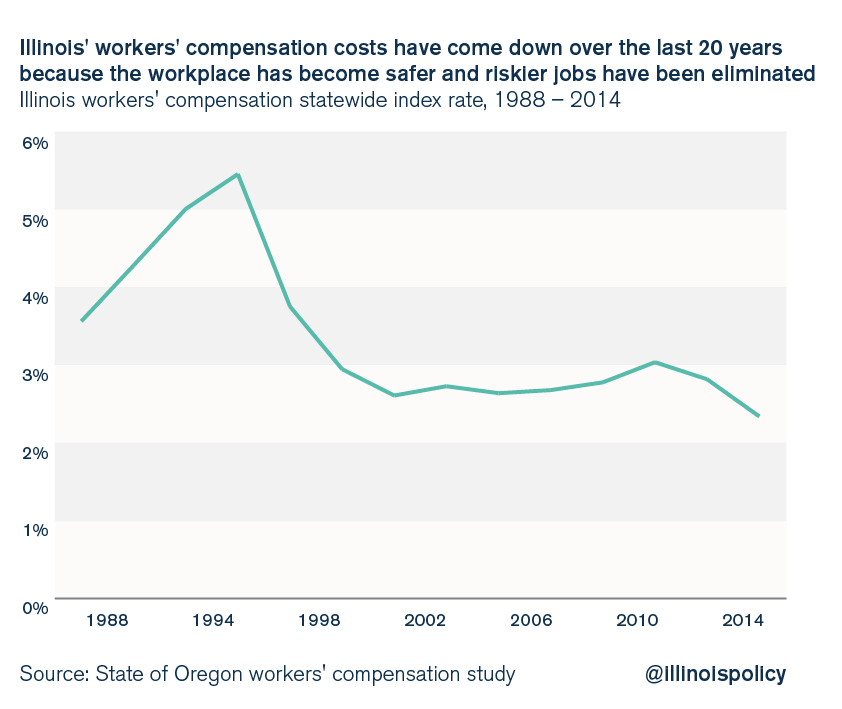
Why would this be? According to a Bureau of Labor Statistics state survey of occupational injuries and illnesses, the incidence rate of workplace illnesses and injuries has declined dramatically over this time period. (Data are not available prior to 1998.)
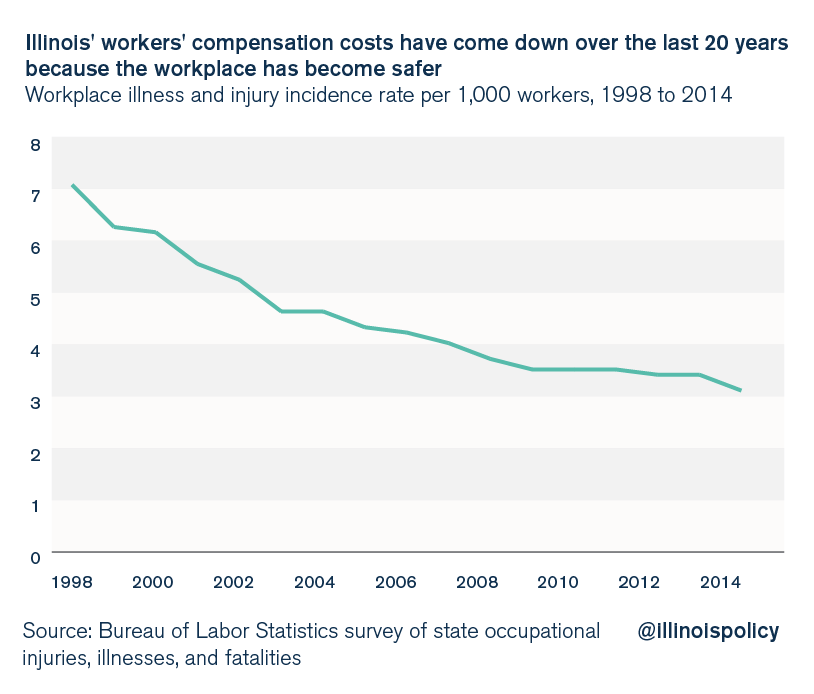
Additionally, workers in industries with more expensive workers’ compensation costs have been losing their jobs in Illinois and many other states. For example, the manufacturing, construction and transportation sectors have all seen a significant decline as a percentage of total jobs in Illinois from 1994 to 2014. This means that costs came down because there are fewer risky jobs and more safe jobs.
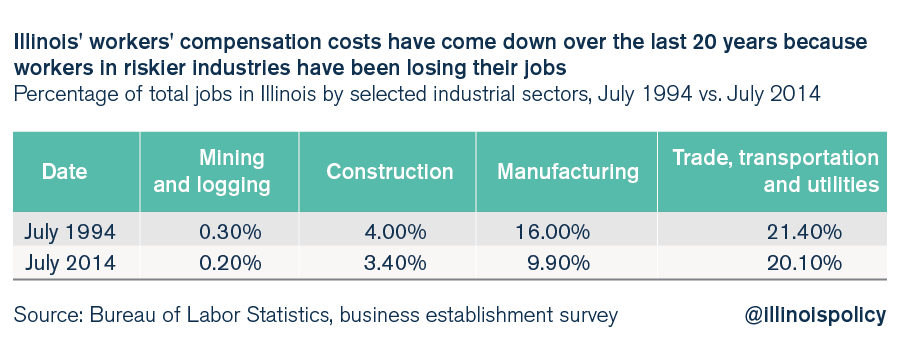
Finally, if Illinois’ costs were coming down because Illinois was doing some things right and improving its system, then Illinois’ standing among the states would likely improve. However, Illinois’ position has actually worsened.
Prior to former Gov. Rod Blagojevich’s 2005 legislation, which made Illinois less competitive, the worst ranking Illinois recorded was ninth-most-expensive in the nation in 1994, and Illinois usually ranked around 20th. Since Blago’s 2005 legislation has worked its way into the system, Illinois has ranked No. 3, No. 4 and No. 7 for the costliness of its workers’ compensation system.
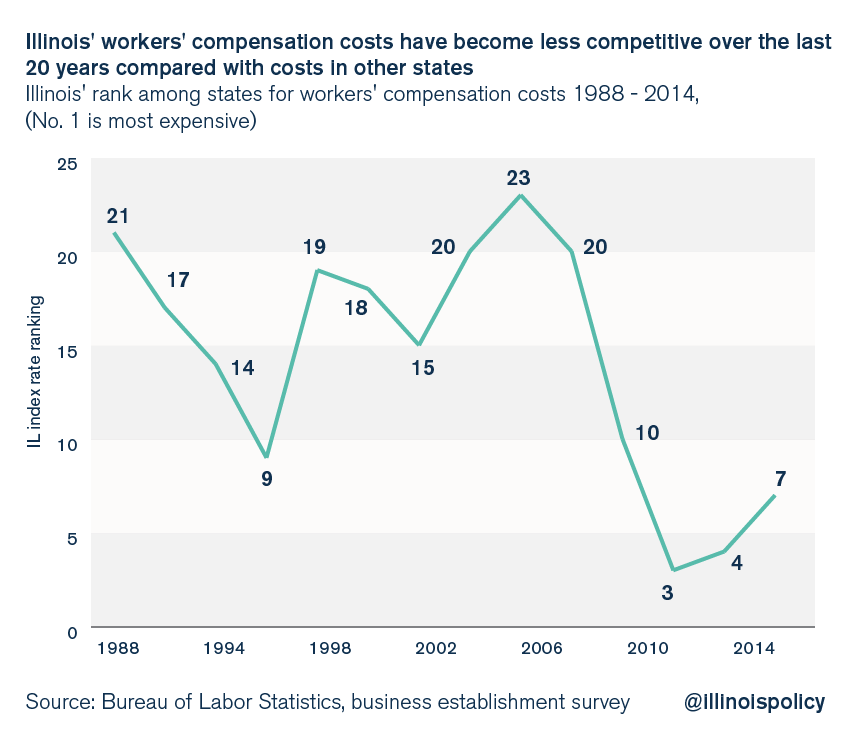
Cullerton has been around long enough that he shouldn’t be making such obvious errors on an important issue. He is at best misleading Illinoisans on a critical issue and at worst showing incompetence to govern and understand basic regulatory legislation.
